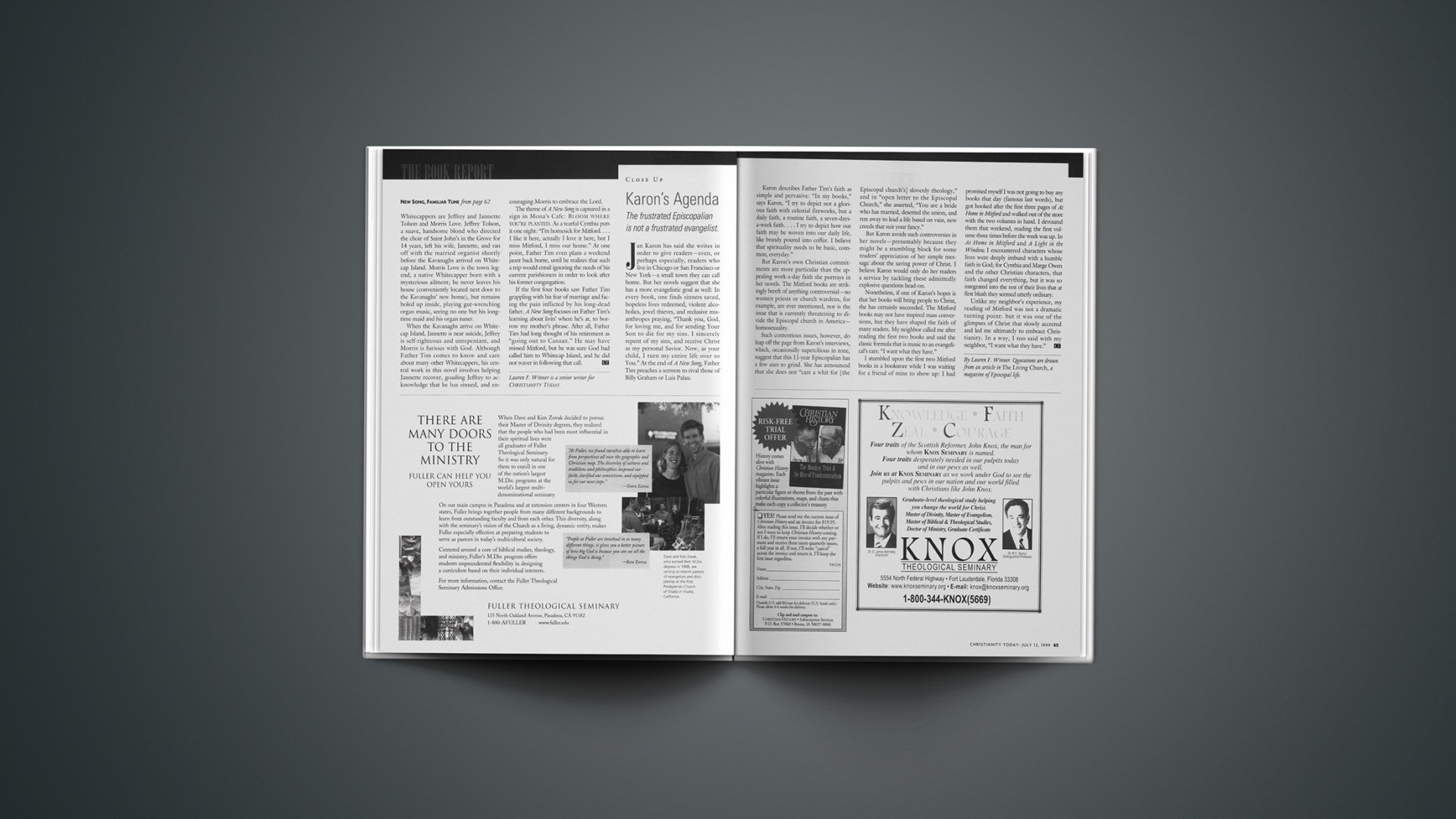Jan Karon has said she writes in order to give readers—even, or perhaps especially, readers who live in Chicago or San Francisco or New York—a small town they can call home. But her novels suggest that she has a more evangelistic goal as well: In every book, one finds sinners saved, hopeless lives redeemed, violent alcoholics, jewel thieves, and reclusive misanthropes praying, “Thank you, God, for loving me, and for sending Your Son to die for my sins. I sincerely repent of my sins, and receive Christ as my personal Savior. Now, as your child, I turn my entire life over to You.” At the end of A New Song, Father Tim preaches a sermon to rival those of Billy Graham or Luis Palau.
Karon describes Father Tim’s faith as simple and pervasive: “In my books,” says Karon, “I try to depict not a glorious faith with celestial fireworks, but a daily faith, a routine faith, a seven-days-a-week faith. … I try to depict how our faith may be woven into our daily life, like brandy poured into coffee. I believe that spirituality needs to be basic, common, everyday.”
But Karon’s own Christian commitments are more particular than the appealing work-a-day faith she portrays in her novels. The Mitford books are strikingly bereft of anything controversial—no women priests or church wardens, for example, are ever mentioned, nor is the issue that is currently threatening to divide the Episcopal church in America—homosexuality.
Such contentious issues, however, do leap off the page from Karon’s interviews, which, occasionally supercilious in tone, suggest that this 11-year Episcopalian has a few axes to grind. She has announced that she does not “care a whit for [the Episcopal church’s] slovenly theology,” and in “open letter to the Episcopal Church,” she asserted, “You are a bride who has married, deserted the union, and run away to lead a life based on vain, new creeds that suit your fancy.”
But Karon avoids such controversies in her novels—presumably because they might be a stumbling block for some readers’ appreciation of her simple message about the saving power of Christ. I believe Karon would only do her readers a service by tackling these admittedly explosive questions head-on.
Nonetheless, if one of Karon’s hopes is that her books will bring people to Christ, she has certainly succeeded. The Mitford books may not have inspired mass conversions, but they have shaped the faith of many readers. My neighbor called me after reading the first two books and said the classic formula that is music to an evangelical’s ears: “I want what they have.”
I stumbled upon the first two Mitford books in a bookstore while I was waiting for a friend of mine to show up: I had promised myself I was not going to buy any books that day (famous last words), but got hooked after the first three pages of At Home in Mitford and walked out of the store with the two volumes in hand. I devoured them that weekend, reading the first volume three times before the week was up. In At Home in Mitford and A Light in the Window, I encountered characters whose lives were deeply imbued with a humble faith in God; for Cynthia and Marge Owen and the other Christian characters, that faith changed everything, but it was so integrated into the rest of their lives that at first blush they seemed utterly ordinary.
Unlike my neighbor’s experience, my reading of Mitford was not a dramatic turning point: but it was one of the glimpses of Christ that slowly accreted and led me ultimately to embrace Christianity. In a way, I too said with my neighbor, “I want what they have.”
Copyright © 1999 Christianity Today. Click for reprint information.










